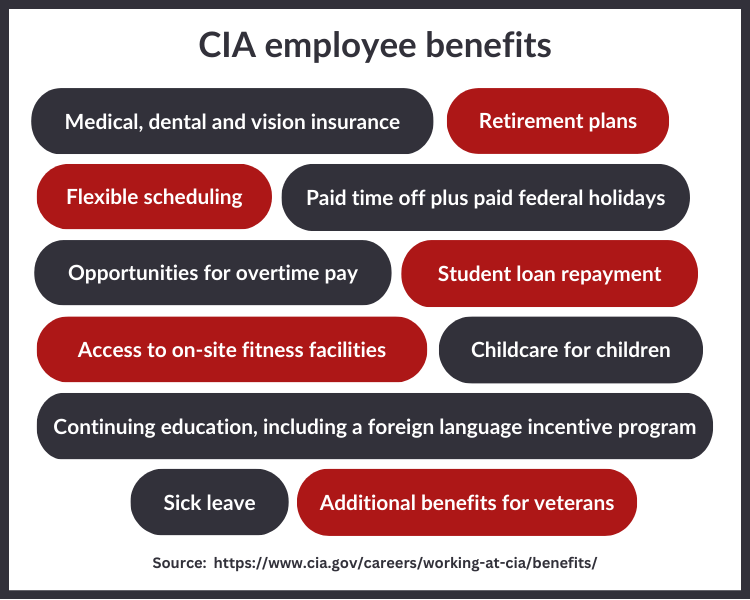In this Article
CIA agent: Requirements and education

CIA agent requirements at a glance
What you’ll do: There are a number of different roles in the CIA, but the agency’s overall mission is to collect intelligence to protect the U.S. from foreign threats
Where you’ll work: All positions are based in the Washington D.C. area but frequently require work overseas
Education you’ll need: Bachelor’s degree at a minimum
Median annual salary: $72,280, according to the U.S. Bureau of Labor Statistics (Police and sheriff’s patrol officers)
The primary mission of the Central Intelligence Agency (CIA) is to protect the United States, mainly through collecting and analyzing foreign intelligence and carrying out covert operations. It’s important to note that the CIA, unlike the FBI and Homeland Security and other agencies within the intelligence community, has no actual law enforcement function. There are many different positions available at the CIA, with many of them based abroad.
The CIA maintains rigorous hiring standards. When looking at a career at CIA, make sure you start by looking at the requirements which include:
- You must be a U.S. citizen (dual citizenship is acceptable).
- You must be willing to relocate to the Washington, D.C. area. (Some travel may be necessary.)
- You must adhere to the CIA’s strict no-drug policy, which includes marijuana. The CIA drug tests each applicant.
- You must be at least 18 years old.
Education for CIA Agent roles in 7 steps
Choose your degree.

CIA officers must have a minimum of a bachelor’s degree, and some roles require graduate degrees.
Many different degrees can prepare you for a career at the CIA. Criminal justice and political science are the most common, but people with a wide variety of educational backgrounds are encouraged to apply. Some roles require specific degrees, while others do not.
Here are some fields to consider, per the CIA:
• Science, Technology, Engineering and Math (STEM)
• International Studies
• Foreign Language
• Business, accounting and finance
• Law
Find the right school.

Finding a school that has a strong program in your subject area is the next step in your education. Investigate the school’s credentials and reputation in order to find a program that will set you up for success in your career. It may also be worth exploring whether a school offers any programs with concentrations that strengthen other skills.
In addition to academics, it’s important to take into account a school’s location, size, campus culture, and program schedule to determine if their program can accommodate your individual needs and desires.
Federal jobs require that your degree be earned from an accredited college or university. Accreditation is also typically a requirement to receive federal financial aid or to be accepted to graduate school.
Apply to your school.

A career in the CIA will most likely begin with your education. You will need a high school diploma or GED to apply for a college or university, but beyond that, you’ll see there are some differences in prerequisites.
Some schools will expect you to have a certain GPA. For competitive schools, this may be above a 3.5. Less competitive schools will admit students with GPAs in the 3.0 or even 2.5 range. Some schools will expect to see SAT scores. In some cases, high SAT scores can help offset a lower GPA or vice versa.
Earn your degree.

Earning a bachelor’s degree typically takes four years of full-time study. Studying part-time is a viable option for many people, although it will take longer. A graduate degree generally requires an additional 18 months to two years of full-time study beyond a bachelor’s degree.
Many degrees require an internship to graduate. You may expect to see these in business and accounting, and law and STEM fields among others.
Students can also apply for a year-long internship with the CIA in a range of studies. In these internships, you can work with experts in their field to gain real-world experience in the intelligence community, and by working with your school, you can generally arrange academic credit for the time you put in. Some of the subject areas available include:
• Finance
• Economics
• Foreign language
• Engineering
• Information technology
Find your first job and gain experience.

Some positions with the CIA require one or more years of professional experience in addition to a college degree. This time spent working before joining the CIA is a good time to ensure you learn the latest skills in your field. It’s also a good time to earn any certifications that may augment your degree and make you stand out among other CIA candidates.
Examples of certifications for professions in demand by the CIA include:
• Accounting: Individuals can become Certified Public Accountants, Certified Internal Auditors and Certified Government Financial Managers.
• Telecommunications: The CIA is looking for individuals with network, security and other computer certifications.
Apply to the CIA.

Applying for the CIA is long and involved—the five-step process can take more than a year. Below is a summary of the application process:
Online application: You must be physically within the United States or its territories when you apply. You may travel abroad briefly during the application and hiring process, but applicants are warned against contacting the CIA in any manner, including postal mail or email, while overseas.
Screening, testing and interviews: If the CIA is interested in pursuing your application, you will take part in phone screening and testing. This may include in-person interviews at a secure CIA site. It can also include aptitude and personality tests.
Conditional employment offer: Applicants who make it through testing and interviewing will be given a conditional offer of employment. The CIA will begin working on your security and medical evaluations as part of the clearance process.
Evaluations: The security and medical evaluations are extensive and can take from six to 12 months to complete. This portion will include polygraph testing; a thorough background investigation, which involves interviewing friends, neighbors and colleagues; and a physical and psychological examination.
Job offer: If successful through each step and there’s a position you qualify for, you may be offered a job with the CIA. Keep in mind: The CIA specifically states not to mention you have applied to the CIA on any social media and to use discretion when discussing your application with family and friends. Also, the CIA is known to be very stringent on its anti-drug use policy.
Complete your training.

After you are hired, you will receive training from the CIA based on your role.
Some new hires may receive training through the Federal Law Enforcement Training Program, while others may take courses at one of the CIA’s training centers, including the Sherman Kent School for Intelligence Analysis.
Expect ongoing training. Some training will be mandatory, such as for firearms and tactical training, and updated legal information. Other training is optional but offered to help you improve your skills or expertise.
Decide if a career in the CIA is right for you
Some may think of spy vs. spy thriller movies when they think of the CIA. In reality, as the nation’s premier intelligence agency, the CIA employs and depends on many types of skilled professionals to accomplish its mission.
The CIA defines its mission as pre-empting threats and maintaining national security by:
What you’ll do as a CIA agent
The CIA has more than 100 different job titles and each is essential to its mission. These positions range from accountant to graphic designer, to physician to tax attorney. Each performs an integral service in CIA operations.
Here are a few examples of different career paths available with the CIA:
- Investigations:
- As an Inspector General criminal investigator, you will investigate fraud, waste and wrongdoing within the CIA. This involves interviewing, gathering evidence, preparing reports, and providing testimony.
- Technical and engineering:
- Telecommunications Services Officers operate and manage IT support overseas. They are also responsible for voice communications systems and help with operating emergency power, and heating and air conditioning systems.
- Security:
- Cyber security officers protect data and systems. They protect the security of IT systems and anticipate any future threats, risks or challenges.
- Clandestine services:
- Acting as a liaison, the Staff Operations Officer work between CIA headquarters and the directors of field operations to ensure a successful operation. The position is responsible for finding solutions to complex problems and using resources fully to meet objectives.
- Language opportunities:
- Language officers provide support by translating and interpreting a foreign language into English. They also give cultural insight and context into customs and behaviors.
- Analytical opportunities:
- The Science, Technology and Weapons Analyst position at the CIA analyzes foreign weapons, warfare, and technologies. This intelligence is key to senior staff for comprehensive and accurate decision-making.
How long does it take to become a CIA agent?
There are a number of factors that will affect how long it will take you to become a CIA officer.
One variable is education. All CIA positions require a bachelor’s degree, but some may prefer or require a master’s or doctorate degree. Another variable is experience: Most CIA jobs want at least at least one year of prior experience, but some require three to five years.
…it generally takes at least six years from the start of a bachelor’s degree until you could be officially hired by the CIA.
Given these factors, along with the year it usually takes to complete the application process, it generally takes at least six years from the start of a bachelor’s degree until you could be officially hired by the CIA.
Where you’ll work
The CIA requires employees to live in the Washington D.C. area as a condition of their employment. You can be living anywhere in the United States or its territories when you apply, but you must agree to relocate once hired.
As a CIA officer, you may travel out of the country for work. You may be assigned overseas for a period of time.
CIA agent salary
The Bureau of Labor Statistics includes CIA officers along with all law enforcement officers in its pay estimates for police officers and sheriffs. According to the BLS, these individuals earn a median annual salary of $72,280.
Conditions in your area may vary. When broken down by state government level, federal police earn an average annual salary of $78,520. Salary is based on national data, not school-specific information. Compare other careers that are part of the CIA’s roster of careers.
However, federal employees, like those who work for the CIA, have their salaries set by the federal pay scale. This pay scale includes grades and steps that take position and experience into account. It also includes a pay differential for cost of living—employees who are based in more expensive cities are given a boost in base salary to help offset the higher expenses.
Additionally, federal employees receive a full benefits package. In addition to time off and medical insurance, CIA employees are eligible for student loan repayment and can take advantage of the CIA’s childcare program.

Professional resources for CIA careers
Most CIA employees will receive on-the-job and ongoing training as part of their employment. This helps ensure they are at the top of their field and always current on the latest technologies and techniques.
Beyond CIA-provided training, it can be beneficial to seek outside professional resources to further advance your knowledge and skills. You may want to explore resources that pertain specifically to your area of expertise, such as business, language, or engineering.
Here are some examples of three organizations devoted to national and international affairs that often pertain to CIA work and a link to their podcasts.
Rand Corporation: The Policy Current Podcast
Council on Foreign Relations: Several podcasts, including The World Next Week
Center for Strategic and International Studies: Several podcasts, including The Truth of the Matter

